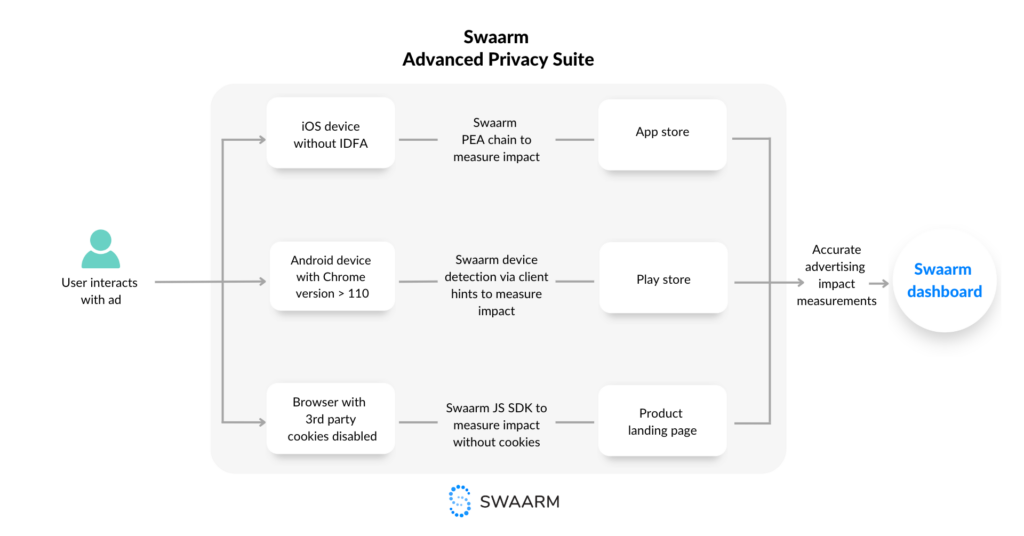Solutions and strategies for mobile attribution in 2023 and beyond
If you’re confused about the current state of Google’s cookie deprecation, you aren’t alone. The search and ad giant has pushed out the deprecation of cookies multiple times — starting in 2020. In July 2022, the Privacy Sandbox initiative was pushed back again, this time to late 2024. According to a blog post by Google, “By Q3 2023, we expect the Privacy Sandbox APIs to be launched and generally available in Chrome. As developers adopt these APIs, we now intend to begin phasing out third-party cookies in Chrome in the second half of 2024.”
However, that doesn’t mean other privacy protections aren’t moving forward — and marketers need a strategy to handle the inevitable changes.
The original promise of digital advertising
From its inception, internet advertising was touted as the most measurable form of advertising available to marketers. The promise was that the ad tech powering internet marketing can count exactly how many viewers have watched or interacted with an ad — something street, radio, or TV advertising could not do. By the late 2010s, digital advertising was at its peak with an unprecedented amount of data at marketers’ fingertips.
The same technology that allowed marketers to track ad interactions (cookies and other identifiers) also allowed publishers and ad networks to store and collect information on an individual level. User profiles made targeted marketing relatively easy but led to pushback from users and privacy groups.
For instance, back in 2010, Apple was sued for sharing user information without permission via the UDID (Unique Device Identifier). The UDID was a permanent identifier attached to each device — and, notably, was available to all apps. The result was the introduction of IDFA in 2012. Users could reset their IDFA and also withhold from advertisers via a “Limit Ad Tracking” (LAT) setting. (More on IDFA later.) Users are now more privacy-focused than ever, and everyone from governments to device manufacturers — including Apple — is pushing for sweeping changes to privacy.
Photo by Jonas Leupe on Unsplash
The latest in mobile tracking and privacy
While marketers wait for Google to finally pull the trigger on Privacy Sandbox changes, a lawsuit in the EU is forcing Google’s hand. France’s data protection agency CNIL fined Google €150 million for using confusing language in banners, which allowed users to accept all cookies with one click but routed them through several screens to reject them. According to EU regulations, this was against the law, and Google is now forced to allow EU Chrome users to reject all cookies with one click.
That being said, Google already began the process of removing important information from the user-agent since Chrome version 106 — making probabilistic matching (fingerprinting) less reliable. Regardless of when Google fully implements Privacy Sandbox and says goodbye to third-party cookies once and for all, it behooves marketers to prepare for the inevitability of privacy-centric changes. Digital marketers have grown used to using identifiers to track and target users — but they also rely on identifiers to attribute installs and in-app conversions to the appropriate channels. However, over the past few years, mobile marketers have gotten a glimpse into what a cookie-less future may look like.
In 2021, with the introduction of App Tracking Transparency (ATT), Apple made it mandatory that apps ask for permission to track users. iOS users opted out in droves, sending shockwaves through the industry, with billions of dollars in ramifications — especially for companies like Meta and Google. Shortly after ATT took effect, Google hopped on the mobile privacy bandwagon, announcing that it would add Android devices to Privacy Sandbox to “improve user privacy and enable effective, personalized advertising experiences for mobile apps.” Much like Google’s other privacy efforts, it has been a slow rollout. Luckily, this gives marketers time to get their privacy-centric strategies in place.
The future of mobile attribution
Many mobile marketers have viewed ATT and other privacy measures as a burden rather than a challenge. Some have opted not to work with Apple’s SKAdnetwork; instead continuing to use fingerprinting to track campaigns or reallocate budgets. Fingerprinting is technically not allowed, according to Apple, though the tech giant has yet to move to enforce it. Still, that change could come at any moment.
Mobile marketers do not need to settle for older, less reliable methods of attribution — or be left twisting in the wind. Two years after ATT first went into effect, the ad tech industry has responded with skilled and adaptable solutions that help track data while still ensuring user privacy. As time goes on — and new changes continue to impact digital marketing — even more solutions will arise.
The ultimate goal is to enable privacy without sacrificing advertising functionality. So in anticipation of App Tracking Transparency and SKAdNetwork, we introduced our industry-first Privacy Enabled Attribution (PEA) chain. In place of the IDFA, Swaarm generates a special token called “PEA Chain” that is passed in the click and can be retrieved in the postback. The token contains all the information networks need to determine the campaign and traffic source. With forward-thinking — and flexibility — we were able to solve the attribution challenge before it truly began.
Innovative tracking solutions are built into Swaarm’s DNA and we’re already prepared for Google’s inevitable changes to Android tracking now.
Swaarm developed support for clients to alleviate the issues introduced by the user-agent deprecation trial. While other tracking solutions rely on device data to be passed by the publishers opening the door for fraud, Swaarm’s tracker can automatically collect the data without requesting extra information from publishers.
Introducing Swaarm’s Advanced Privacy Suite (APS)
A complete solution is offered through Swaarm’s Advanced Privacy Suite (APS) which allows ad networks and advertisers to accurately track every event performed by the user and attribute it to the initial advertising interaction on the publisher side. The accuracy is immaculate even days after a click was performed, while the implementation of the toolkit is simple. The APS employs a variety of techniques to ensure proper event collection in difficult environments, offering both advertisers and ad networks the performance metrics they need.
Swaarm’s Advanced Privacy Suite allows marketers to focus on creating meaningful, successful advertising campaigns by removing the complexity associated with the privacy features introduced by Mobile and Desktop platforms recently.
Performance measurement in marketing is essential for advertisers, publishers, and users. In the face of privacy changes coming in 2023, Marketers must stay ahead of the impending changes. Being prepared will not only solve problems before they start but lead to innovative new strategies and tools to build a better digital advertising ecosystem. Swaarm’s Advance Privacy Suite is the first complete solution in the market that enables privacy without sacrificing performance measurement and advertising functionality.
- Alexandru Dumitru, co-founder and Chief Technology Officer (CTO)
APS makes campaign setup easy by automatically choosing the best attribution and measurement method available for the devices where the advertisements are running. It also increases the efficiency of marketing campaigns ensuring that data needed for anti-fraud solutions is available and that the campaign performance can accurately be assessed no matter where it is running. Finally, it creates cost savings for ad networks by removing the need of allocating technical resources in the campaign setup step.
APS is the industry’s first complete solution enabling privacy without sacrificing advertising functionality.
A wait-and-see approach to mobile privacy is bad business. Marketers — as well as ad tech solutions — must stay ahead of the impending changes. Being prepared will not only solve problems before they start but lead to innovative new strategies and tools to build a better digital advertising ecosystem.
To find out more about the APS solution we recommend Marketers watch our latest webinar, hosted by Swaarm’s founding team, Alexandru Drumitru (Co-founder & CTO) and Yogeeta Chainani (Co-founder & CEO). In the webinar, they cover APS and its benefits more in detail as well as what marketers need to know about privacy changes in 2023 – like Google’s third-party cookie phase-out – and how to prepare for it.
The official launch of APS was covered by GamesBeat lead writer Dean Takahashi in a recent article in Venture Beat.
If you want to learn more about the Advanced Privacy Suite or simply want to learn more about Swaarm, feel free to contact us.





